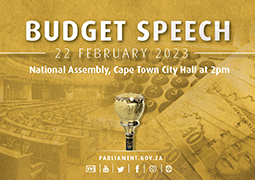
Presenting the 2023 Budget Speech in the National Assembly (NA), the Minister of Finance, Mr Enoch Godongwana, aimed for balance between stimulating economic growth and investor confidence, on the one hand, while on the other, ensuring that government continues with its social investment and security programmes aimed at cushioning the vulnerable from the rising cost of living.
Mr Godongwana said the state must create a stable macroeconomic environment, implement growth-enhancing reforms and improve the capability of the state in rolling out its infrastructure projects and in fighting crime and corruption. He stated: “In this Budget, we are allocating additional resources towards these endeavours without compromising the sustainability of public finances.”
South Africa’s economic growth was higher than expected. South Africa’s economy grew by an estimated 2.5 per cent in 2022. This is an upward revision from the 1.9 per cent projection in the 2022 MTBPS [Medium-Term Budget Policy Statement], reflecting a better-than-expected outcome in the third quarter of 2022. At R4.6 trillion, the size of the economy in 2022 was bigger than the pre-pandemic levels in real terms, evidence of a robust economic recovery.
But despite these gains, “The medium-term growth outlook has deteriorated. Real GDP [gross domestic product] growth is projected to average 1.4 per cent from 2023 to 2025, compared with 1.6 per cent estimated in October.”
The consolidated fiscal framework adopted by government has yielded positive results that have restrained growth, mainly in consumption expenditure, and allowed the government to use part of the higher-than-expected revenues to reduce the deficit. As a result, we are bringing the fiscal deficit down without resorting to tax increases or further cuts in the social wage and infrastructure.
However, debt remains stubbornly high and this will be exacerbated by government’s partial take-over of Eskom debt. “In general, government debt is high. The gross debt stock is projected to increase from R4.73 trillion in 2022/23 to R5.84 trillion in 2025/26. And because debt is high, our debt-service costs are also high.”
The Minister cautioned that sustaining economic growth depends on consolidating South Africa’s fiscal policy so that revenue can be used to reduce the budget deficit. Debt-service costs are projected to average R366.8 billion annually over the medium term, reaching R397.1 billion in 2025/26. These are resources that could otherwise be used to address pressing social needs or to invest in the future.
Economic risks continue to dog the South African economy, Mr Godongwana maintained. One on-going risk are state-owned enterprises and the unaffordable public-sector wage bill. “If these risks materialise, they will require us to make difficult budgeting trade-offs. For these reasons, we must continue exercising fiscal restraint.”
Mr Godongwana told Members of the NA that the current energy crisis is the biggest economic constraint. Record levels of load shedding were experienced in 2022 – 207 days of load shedding compared to 75 days in 2021. To mitigate that, the Minister said the government is acting decisively to bring additional capacity onto the grid and working to transform the electricity sector to achieve energy security in the long term.
GOVERNMENT TAKES OVER ESKOM DEBT
Mr Godongwana announced and explained government’s decision to take over Eskom debt. He said R337 billion of Eskom’s debt is already government guaranteed. Taking on further debt will reduce fiscal risk and enhance long-term fiscal sustainability. Most importantly, it will enable Eskom to undertake its unbundling.
Taking over Eskom’s debt comes with stringent conditions, including a requirement by Eskom to prioritise capital expenditure in transmission and distribution during the debt-relief period to enable it to focus on maintaining existing power generation stations to improve availability of electricity. The debt relief period must also only be used to settle debt and interest payments and to catch up with changes in energy supply and generation sources towards renewables.
Mr Godongwana maintained that this energy transition had to be just and should not disadvantage the communities whose livelihood depend on fossil fuel production. These people must be empowered with the skills necessary to participate in the new clean energies industries. “Our Just Energy Transition plan addresses these urgent climate challenges. It aims to significantly lower emissions of greenhouse gases and harnesses investments in new energy technologies, electric vehicles, and energy-efficient appliances. Most importantly, it ensures that communities tied to high-emitting energy industries are not left behind, but are provided with new skills and new economic and employment opportunities.”
On infrastructure, the Minister said that Operation Vulindlela, which coordinates expenditure, project implementation and planning on infrastructure, water, energy and technology, continues to anchor government’s economic growth. “The public sector is projected to spend R903 billion on infrastructure over the medium-term. The largest portion of this, around R448 billion, will be spent by state-owned companies, public entities and through public-private partnerships.
On revenue outlook and tax proposals, Mr Godongwana stated that tax revenue collections for 2022/23 are expected to total R1.69 trillion. This exceeds the 2022 Budget estimate by R93.7 billion, and the 2022 MTBPS estimate by R10.3 billion. As a result, there are no major tax proposals in this budget. The Minister attributed these gains to improved revenue collections by South African Revenue Service
Abel Mputing
23 February 2023

